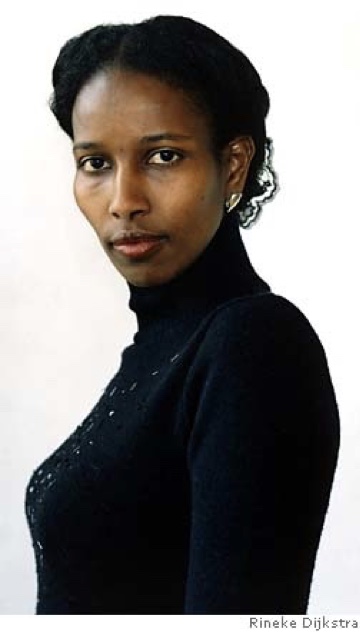Ayaan Hirsi Ali
11/13/1969–Present
Part 1 of 2
The majority of American women are now sexually emancipated, but that isn’t true of women in many African countries. There is a strict patriarchal Islamist edict under which ten of the fifty-four African countries circumcise 50 percent or more of the girls. Far worse, however, than the guardianship system and female mutilation are the fanatical Islamist consequences of shame. A woman’s life is in peril if she becomes pregnant out of wedlock or is raped—but if she marries the rapist, her life may be spared. A husband may beat or even kill a wife who disobeys the dictates of Islam by not covering her hair, body, or face appropriately.
In 1992, Somalian-born Ayaan Hirsi Ali escaped from Africa to Europe after a forced marriage arranged by her father. The svelte black beauty settled in Holland. She lied about her name and date of birth to make it more difficult for her husband to track her, and applied for and was granted refugee status. In 1997 she became a Dutch citizen.
Four years later, during 9/11, Ayaan was appalled by TV coverage of Muslim kids jubilating. This led her to analyze the Quran and Bin-Laden’s quotes from it. She concluded that the Quran was not a holy document but rather disseminated a culture of brutal bigotry and control of women. She decided to wake up those well-meaning people who thought Islam was peace and tolerance.
Ayaan has admitted that in 1989, at age nineteen, she supported the Ayatollah Khomeini’s fatwa against Salman Rushdie. In early 2002, however, Hirsi Ali became an atheist and spoke publicly and wrote that people should rigorously analyze Islam. She asserted that Islamic education was inappropriate and perpetuated female subjugation.
She even contended that Muhammad was a cruel man and a pedophile who had consummated marriage with his nine-year-old wife.
By May 2002, Hirsi Ali’s life was threatened. On the anniversary of 9/11 she was given her first bodyguards. In October 2002, for safety’s sake, she fled to California for a few weeks. There, she accepted an invitation to run for the Dutch Parliament because she wanted to help end the oppression of Muslim women. As a national political figure who was receiving death threats, she was shielded by Holland’s Royal and Diplomatic Protection Service.
In 2003, she won her seat on three issues: 1) discontinue financing Muslim schools and disallow homeschooling based on religion; 2) reduce unemployment benefits because people made more money from welfare than they could from actual jobs; and abolish the minimum wage which would increase the number of available jobs; 3) require police to register honor killings.
When, in 2004, Theo van Gogh was murdered for producing an anti-Islamic film with Ayaan, a note was found pinned to his chest. It stated, “Hirsi Ali is next.” For the following two and a half months, her security was so stepped-up that she basically had no freedom and was even denied phone and email communication. She was sent to locations the whereabouts of which were withheld from her, and she had no privacy beyond her bedroom. Nonetheless, in 2005, Time magazine named her one of the 100 most influential people in the world.
In 2006 Ayaan’s Dutch political career came to an abrupt halt when she was threatened with loss of her citizenship. Since starting her run for Parliament, she had been open about her falsehoods of fourteen years earlier; nonetheless, it was treated as information she had withheld, and officially invalidated her citizenship. Before the issue was resolved, Ayaan resigned from Parliament.
She relocated to the U.S. and found work to continue her mission at the American Enterprise Institute (AEI), a Washington, D.C.-based think tank that researches government, politics, economics, and social welfare. By 2007, she had founded the AHA Foundation, which works to protect women and girls in the U.S. from female genital mutilation (FGM), child and forced marriage, and honor violence by advocating the expansion and strengthening of federal and state laws. At age five, when her parents had been out of town, Hirsi Ali herself had been a victim of a clitorectomy which her grandmother supervised—despite knowing that both parents opposed FGM. Upon their return, the parents were infuriated.
In 2011, Hirsi Ali married a British historian, and in 2012 they had a son. In 2013 Hirsi Ali became a proudly assimilated U.S. citizen.
In 2014, the Council on American-Islamic Relations (CAIR) and others accused Hirsi Ali of hate speech, and her invitation to speak and receive an honorary degree at Brandeis University was revoked. She responded that the “spirit of free expression” had been betrayed and stifled.
To Be Continued

